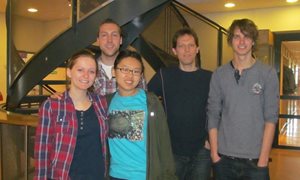20 February 2020
Christian Beckmann, DCMN, theme Stress-related disorders.
Big data for precision medicine: new tools for brain connectopics.
Christian Beckmann is appointed as professor Statistical Imaging Neuroscience. His research focus is on developing novel methods for imaging neurosciences. Over the last two decades neuroimaging has made significant contributions to our understanding of human brain function. The indirect nature of the data requires sophisticated modeling and analysis approaches in order to infer interpretable quantities of interest.
The researcher will develop techniques that allow researchers to better understand human brain processes and compare individual patients to ‘normal’ ranges of cognitive functioning. These techniques will be tested in a large Dutch sample of early Parkinson’s Disease patients to better understand the underlying neurobiology of the disorder.

Sander Leeuwenburgh, RIMLS, theme Reconstructive and regenerative medicine.
Regeneration of diseased bone by biomaterials built from nanoparticles.
Sander Leeuwenburgh is professor Regenerative Biomaterials. His research group is developing injectable and self-healing biomaterials which stimulate the regenerative capacity of the human body.
Currently available biomaterials are not able to heal defects in diseased bone effectively. In this project novel self-porous and healing biomaterials will be self-assembled from nanoparticles to release antibacterial and anticancer drugs directly into cells. These new properties will accelerate bone regeneration and combat bone diseases effectively.

Annette Schenck: DCMN, theme Neurodevelopmental disorders.
Towards treatment of Intellectual Disability and Autism disorders.
Annette Schenck is Associate Professor in Translational Genomics of Neurodevelopmental Disorders. Her research focuses on dissecting molecular networks and mechanisms underlying human brain function and disease. In order to be able to investigate the large number of genes, we use a powerful genetic model organism, the fruitfly Drosophila melanogaster.
Intellectual disability and autism are frequent and currently untreatable disorders. This project will use an ancient, highly conserved form of learning and the fruit fly as a model to investigate the neurobiology of these disorders and develop effective translational treatment strategies for subgroups of patients.


Christian Beckmann, DCMN, theme Stress-related disorders.
Big data for precision medicine: new tools for brain connectopics.
Christian Beckmann is appointed as professor Statistical Imaging Neuroscience. His research focus is on developing novel methods for imaging neurosciences. Over the last two decades neuroimaging has made significant contributions to our understanding of human brain function. The indirect nature of the data requires sophisticated modeling and analysis approaches in order to infer interpretable quantities of interest.
The researcher will develop techniques that allow researchers to better understand human brain processes and compare individual patients to ‘normal’ ranges of cognitive functioning. These techniques will be tested in a large Dutch sample of early Parkinson’s Disease patients to better understand the underlying neurobiology of the disorder.

Sander Leeuwenburgh, RIMLS, theme Reconstructive and regenerative medicine.
Regeneration of diseased bone by biomaterials built from nanoparticles.
Sander Leeuwenburgh is professor Regenerative Biomaterials. His research group is developing injectable and self-healing biomaterials which stimulate the regenerative capacity of the human body.
Currently available biomaterials are not able to heal defects in diseased bone effectively. In this project novel self-porous and healing biomaterials will be self-assembled from nanoparticles to release antibacterial and anticancer drugs directly into cells. These new properties will accelerate bone regeneration and combat bone diseases effectively.
Annette Schenck: DCMN, theme Neurodevelopmental disorders.
Towards treatment of Intellectual Disability and Autism disorders.
Annette Schenck is Associate Professor in Translational Genomics of Neurodevelopmental Disorders. Her research focuses on dissecting molecular networks and mechanisms underlying human brain function and disease. In order to be able to investigate the large number of genes, we use a powerful genetic model organism, the fruitfly Drosophila melanogaster.
Intellectual disability and autism are frequent and currently untreatable disorders. This project will use an ancient, highly conserved form of learning and the fruit fly as a model to investigate the neurobiology of these disorders and develop effective translational treatment strategies for subgroups of patients.

Related news items

Miniaturized microfluidic platform for automated epigenetic profiling
6 May 2021 Together with Fluidigm, a US-based company focusing on microfluidics, the team of Hendrik Marks publishes in Genome Research the development of a powerful plug and play ChIP-seq platform for minute amount of cells, such as embryonic specimens or small biopsies. read more
3 DCMN researchers among most cited scientists
10 December 2018 Christian Beckmann, Jan Buitelaar and Barbara Franke made it to this year’s list of highly cited researchers. Scientists in this list are selected for their exceptional research performance and are regarded to have had a major impact on fellow scientists. read more
Researchers launch mini-documentary on ADHD
1 November 2018 Previous Wednesday, on the last day of the ADHD Awareness Month, several European research consortia launch a mini-documentary about ADHD. People with ADHD and their loved ones explain how they deal with ADHD in very different ways. read more
Researchers and industry join forces to unravel and treat autism Public-private project AIMS-2 receives 110 million euros from IMI
12 July 2018 In a large public-private project, supported by 110 million euros by the IMI, a large consortium of researchers will search for biomarkers with which people with autism can be divided into clear subgroups. read more
A low cholesterol level is not a good thing
21 June 2018Research shows that low cholesterol can also be harmful. Researchers from Radboudumc and their Australian and American colleagues discovered a new metabolic defect, producing very low cholesterol levels. This causes brain anomalies, developmental delay, epilepsy and typical facial deformities.
read more
